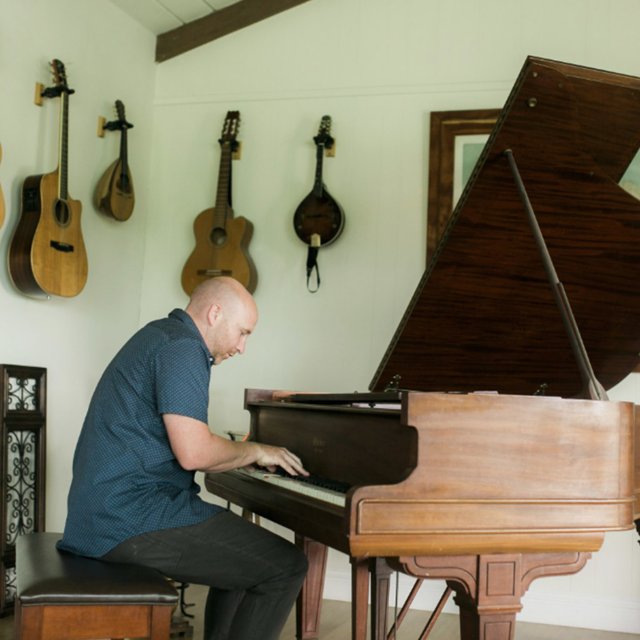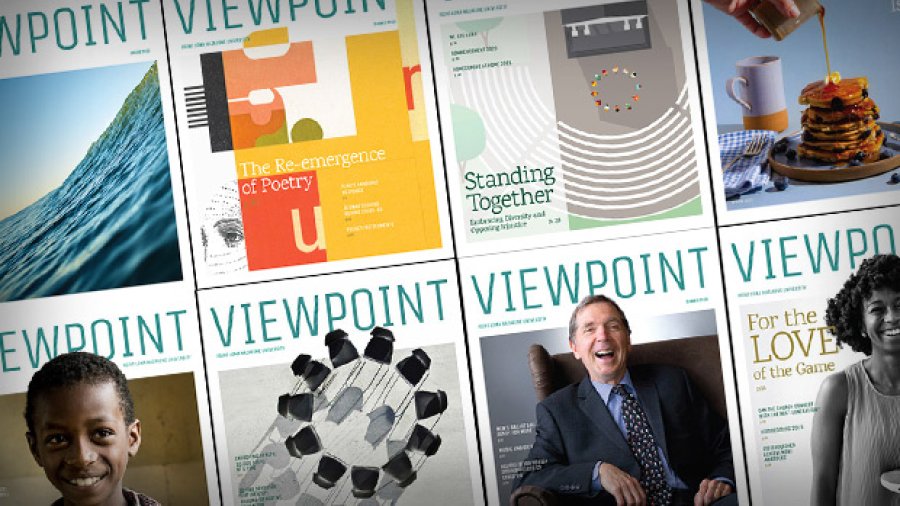
We sat down with PLNU’s director of Worship Ministries to discuss his views on effective worship and what he hopes students take away from their time at PLNU.
Q: What is your understanding or practical theology of worship?
A: In my early years of leading worship, I came across a book in which somebody examined the Old English word “weorthscipe.” It speaks about the recognition of worth. It was a helpful thought for me to hold in my mind as I figured out how I could offer up more elements of my day to God, recognizing God’s worth and responding more fully in worship with all I have and am. So when we gather together to offer up songs of worship, we’re taking time to engage our thoughts, our spirit, our bodies, our whole self, in thoughts of God — and in the midst of that, we’re recognizing God’s phenomenal worth.
Q: What do you think churches need most to facilitate worshipful engagement with God?
A: It would start with good theology. What we sing must speak truthfully about who God is and who we are in Christ Jesus. Otherwise, we’re leading people in a really bad direction. We have a responsibility to make sure that the words lingering throughout the week in people’s hearts and minds are truthful. This includes both the language of song lyrics and the ways in which a worship leader might pray or at times share a brief thought contextualizing the song. The second thing would probably be doing the best we can with what we have — knowing that not every church has great resources to work with in terms of talent or equipment, but still trying to make it as beautiful as possible. I think God so often uses beauty to awaken our consciousness to His presence. If the music is played well and prayerful thought has been put into it, it can stir people and move them to worship.
Also, we need to eliminate as many distractions as possible from the environments where people gather for worship. It’s so easy for people to get distracted by the simplest of things and begin to disengage their minds and their spirits, so it’s important to identify those things and address them. If we do have amazing resources, technology can definitely be harnessed to help move people to worship, but it can be terribly abused as well. The technology itself can become a distraction. The music can also become a distraction, either because it’s played poorly or because it’s overly showy, becoming the object of worship rather than a vehicle to worship.
Q: As a leader here, what is your hope for PLNU students?
A: At some point, even if it is just for a few chapels in their [student] career, that they would be disciplined and courageous enough to not be concerned about what those sitting around them are thinking about them — that they would really pay attention, thinking about the meaning of the lyrics, the beauty of the music, the proclamation of the Word, letting it all move them and speak to them. It is my desire that they would engage in recognizing God’s worth and presence in those services of worship and then continue to recognize it as they move into the rest of their day. Also, my hope is that there would be moments in every student’s career where the familiar space in Brown Chapel becomes very sacred and that, just for a moment, they would lose sight of what is around them — the chairs and carpet and band and screens and lights and coffee — and in doing so, be able to step away from the seen and the temporary into the unseen and the eternal. That’s something that really only God’s Spirit can do in us, but I think for the most part, we need to be paying attention as well. That would be just wonderful if for a moment we moved into that place together. Finally, I hope that when students graduate, they will be able to recall a few significant chapel services that helped mark their journey as a Christian at PLNU.
Q: What is your hope for the students who are leading their peers in worship?
A: My hope is that each of those musicians would see their visibility on the platform as an opportunity to truly be a light — not just on stage, but in the classroom, the dining hall, the residence halls, and every other area of their lives. I want them to feel that it is a total privilege and not a burden to be a light on a pedestal, that their life might, as Jesus said, “give light to everyone in the house.” My hope is that those students would, through their involvement in worship ministries, have a desire to truly be people of integrity, and that they would look like people who are following Jesus and patterning their lives after Jesus wherever they go. Another hope I have for them is that they would see their musical gifts as something to be stewarded well, which means those talents need to be developed. My hope is they would be better musicians and vocalists and better worship leaders when they graduate — that they would see the different ways their music and countenance can lead and draw people into worship and into recognizing God’s worth. I hope that they fall so in love with ministry and relationships and music-making that when they graduate, they say, “I want to continue to serve in the local church with this gift for the rest of my life.”

The Viewpoint
PLNU's university publication, the Viewpoint, seeks to contribute relevant and vital stories that grapple with life's profound questions from a uniquely Christian perspective. Through features, profiles, and news updates, the Viewpoint highlights stories of university alumni, staff, faculty, and students who are pursuing who they are called to be.